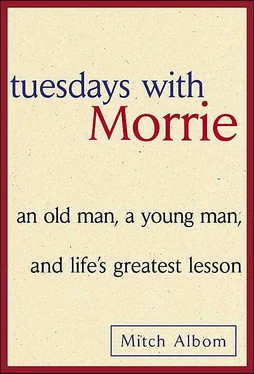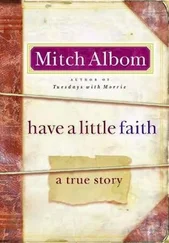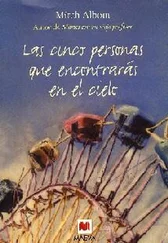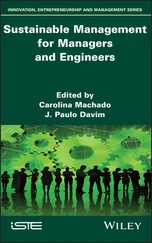Before college I did not know the study of human relations could be considered scholarly. Until I met Morrie, I did not believe it.
But his passion for books is real and contagious. We begin to talk seriously sometimes, after class, when the room has emptied. He asks me questions about my life, then quotes lines from Erich Fromm, Martin Buber, Erik Erikson. Often he defers to their words, footnoting his own advice, even though he obviously thought the same things himself. It is at these times that I realize he is indeed a professor, not an uncle. One afternoon, I am complaining about the confusion of my age, what is expected of me versus what I want for myself.
“Have I told you about the tension of opposites?” he says. The tension of opposites?
“Life is a series of pulls back and forth. You want to do one thing, but you are bound to do something else. Something hurts you, yet you know it shouldn’t. You take certain things for granted, even when you know you should never take anything for granted.
“A tension of opposites, like a pull on a rubber band. And most of us live somewhere in the middle. “
Sounds like a wrestling match, I say.
“A wrestling match.” He laughs. “Yes, you could describe life that way.”
So which side wins, I ask? “Which side wins?”
He smiles at me, the crinkled eyes, the crooked teeth.
“Love wins. Love always wins.”
I flew to London a few weeks later. I was covering Wimbledon, the world’s premier tennis competition and one of the few events I go to where the crowd never boos and no one is drunk in the parking lot. England was warm and cloudy, and each morning I walked the treelined streets near the tennis courts, passing teenagers cued up for leftover tickets and vendors selling strawberries and cream. Outside the gate was a newsstand that sold a halfdozen colorful British tabloids, featuring photos of topless women, paparazzi pictures of the royal family, horoscopes, sports, lottery contests, and a wee bit of actual news. Their top headline of the day was written on a small chalkboard that leaned against the latest stack of papers, and usually read something like Diana in Row with Charles!or Gazza to Team: Give Me Millions!
People scooped up these tabloids, devoured their gossip, and on previous trips to England, I had always done the same. But now, for some reason, I found myself thinking about Morrie whenever I read anything silly or mindless. I kept picturing him there, in the house with the Japanese maple and the hardwood floors, counting his breath, squeezing out every moment with his loved ones, while I spent so many hours on things that meant absolutely nothing to me personally: movie stars, supermodels, the latest noise out of Princess Di or Madonna or John F. Kennedy, Jr. In a strange way, I envied the quality of Morrie’s time even as I lamented its diminishing supply. Why did we, bother with all the distractions we did? Back home, the O. J. Simpson trial was in full swing, and there were people who surrendered their entire lunch hours watching it, then taped the rest so they could watch more at night. They didn’t know O. J. Simpson. They didn’t know anyone involved in the case. Yet they gave up days and weeks of their lives, addicted to someone else’s drama.
I remembered what Morrie said during our visit: “The culture we have does not make people feel good about themselves. And you have to be strong enough to say if the culture doesn’t work, don’t buy it.”
Morrie, true to these words, had developed his own culture—long before he got sick. Discussion groups, walks with friends, dancing to his music in the Harvard Square church. He started a project called Greenhouse, where poor people could receive mental health services. He read books to find new ideas for his classes, visited with colleagues, kept up with old students, wrote letters to distant friends. He took more time eating and looking at nature and wasted no time in front of TV sitcoms or “Movies of the Week.” He had created a cocoon of human activities—conversation, interaction, affection—and it filled his life like an overflowing soup bowl.
I had also developed my own culture. Work. I did four or five media jobs in England, juggling them like a clown. I spent eight hours a day on a computer, feeding my stories back to the States. Then I did TV pieces, traveling with a crew throughout parts of London. I also phoned in radio reports every morning and afternoon. This was not an abnormal load. Over the years, I had taken labor as my companion and had moved everything else to the side.
In Wimbledon; I ate meals at my little wooden work cubicle and thought nothing of it. On one particularly crazy day, a crush of reporters had tried to chase down Andre Agassi and his famous girlfriend, Brooke Shields, and I had gotten knocked over by a British photographer who barely muttered “Sorry” before sweeping past, his huge metal lenses strapped around his neck. I thought of something else Morrie had told me: “So many people walk around with a meaningless life. They seem half-asleep, even when they’re busy doing things they think are important. This is because they’re chasing the wrong things. The way you get meaning into your life is to devote yourself to loving others, devote yourself to your community around you, and devote yourself to creating something that gives you purpose and meaning.”
I knew he was right.
Not that I did anything about it.
At the end of the tournament—and the countless cups of coffee I drank to get through it—I closed my computer, cleaned out my cubicle, and went back to the apartment to pack. It was late. The TV was nothing but fuzz.
I flew to Detroit, arrived late in the afternoon, dragged myself home and went to sleep. I awoke to a jolting piece of news: the unions at my newspaper had gone on strike. The place was shut down. There were picketers at the front entrance and marchers chanting up and down the street. As a member of the union, I had no choice: I was suddenly, and for the first time in my life, out of a job, out of a paycheck, and pitted against my employers. Union leaders called my home and warned me against any contact with my former editors, many of whom were my friends, telling me to hang up if they tried to call and plead their case.
“We’re going to fight until we win!” the union leaders swore, sounding like soldiers.
I felt confused and depressed. Although the TV and radio work were nice supplements, the newspaper had been my lifeline, my oxygen; when I saw my stories in print in each morning, I knew that, in at least one way, I was alive.
Now it was gone. And as the strike continued—the first day, the second day, the third day—there were worried phone calls and rumors that this could go on for months. Everything I had known was upside down. There were sporting events each night that I would have gone to cover. Instead, I stayed home, watched them on TV. I had grown used to thinking readers somehow needed my column. I was stunned at how easily things went on without me.
After a week of this, I picked up the phone and dialed Morrie’s number. Connie brought him to the phone. “You’re coming to visit me,” he said, less a question than a statement.
Well. Could I?
“How about Tuesday?”
Tuesday would be good, I said. Tuesday would be fine.
In my sophomore year, I take two more of his courses. We go beyond the classroom, meeting now and then just to talk. I have never done this before with an adult who was not a relative, yet I feel comfortable doing it with Morrie, and he seems comfortable making the time.
“Where shall we visit today?” he asks cheerily when I enter his office.
Читать дальше












